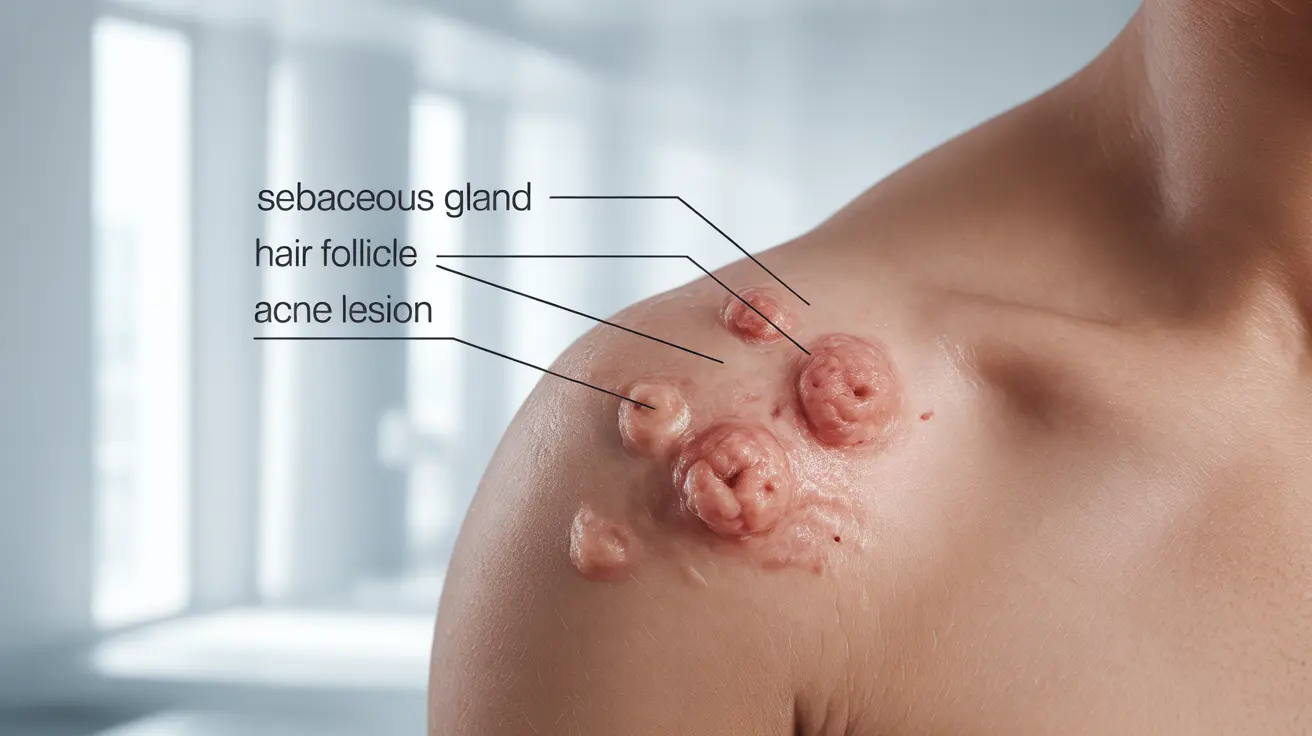Shoulder acne, a common skin condition affecting many adults and teenagers, can be both uncomfortable and frustrating to deal with. This form of body acne develops when hair follicles on the shoulders become clogged with oil, dead skin cells, and bacteria, leading to inflammation and breakouts. Understanding its causes and treatment options is essential for effective management.
While facial acne often gets more attention, shoulder acne requires specific care due to the unique characteristics of shoulder skin and the environmental factors that affect it. This comprehensive guide will help you understand what causes shoulder acne, how to treat it effectively, and ways to prevent future breakouts.
Common Causes of Shoulder Acne
Several factors contribute to the development of shoulder acne, making it important to identify the specific triggers affecting you:
Friction and Pressure
Tight clothing, backpack straps, and athletic equipment can create friction against the skin, leading to a type of acne called acne mechanica. This mechanical irritation can trap sweat and bacteria, creating an ideal environment for breakouts.
Sweat and Exercise
Post-workout bacteria and sweat that remains on the skin can clog pores and cause inflammation. This is particularly common among athletes and fitness enthusiasts who don't shower immediately after exercise.
Hormonal Influences
Hormonal fluctuations, especially during puberty, menstruation, or conditions like polycystic ovary syndrome (PCOS), can increase oil production and contribute to shoulder acne.
Effective Treatment Options
Over-the-Counter Solutions
Several readily available treatments can help manage shoulder acne:
- Benzoyl peroxide body wash (2.5-10%)
- Salicylic acid-based products
- Tea tree oil cleansers
- Exfoliating body scrubs with alpha-hydroxy acids
Prescription Treatments
For more severe cases, a healthcare provider might recommend:
- Topical retinoids
- Prescription-strength benzoyl peroxide
- Oral antibiotics
- Hormone-regulating medications
Prevention Strategies
Clothing Choices
Making smart clothing decisions can significantly impact shoulder acne:
- Wear loose-fitting, breathable fabrics
- Choose moisture-wicking materials for exercise
- Change out of sweaty clothes promptly
- Wash workout clothes after each use
Hygiene Practices
Maintaining proper hygiene is crucial for preventing breakouts:
- Shower immediately after exercise
- Use non-comedogenic body products
- Regularly clean backpack straps and sports equipment
- Avoid touching or picking at existing acne
Lifestyle Modifications
Several lifestyle changes can help reduce shoulder acne:
- Maintain a balanced diet rich in anti-inflammatory foods
- Stay hydrated
- Manage stress through relaxation techniques
- Keep hair clean and away from shoulders
- Use clean towels and bedding regularly
When to Seek Professional Help
Consider consulting a dermatologist if your shoulder acne:
- Persists despite consistent home treatment
- Causes significant scarring
- Affects your daily activities or self-confidence
- Is accompanied by severe inflammation or pain
Frequently Asked Questions
What are the main causes of shoulder acne and how does friction from clothing contribute to it? Shoulder acne primarily develops from clogged pores, excess oil production, and bacteria. Friction from tight clothing or equipment creates mechanical stress on the skin, trapping sweat and bacteria while potentially damaging the skin barrier, leading to increased breakouts.
What treatment options are effective for getting rid of shoulder acne, including over-the-counter and prescription medications? Effective treatments include benzoyl peroxide washes, salicylic acid products, and exfoliating scrubs for mild cases. Severe cases may require prescription treatments like topical retinoids, oral antibiotics, or hormone regulators.
How can I prevent shoulder acne from developing or worsening, especially related to clothing and hygiene habits? Prevention involves wearing loose, breathable clothing, showering after exercise, using non-comedogenic products, and maintaining clean exercise equipment and clothing. Regular washing of bedding and avoiding tight straps or backpacks can also help.
Can diet or hormonal changes influence shoulder acne, and what lifestyle adjustments might help reduce breakouts? Yes, both diet and hormones can affect shoulder acne. Maintaining a balanced diet, staying hydrated, and managing stress can help. Some people find reducing dairy or high-glycemic foods beneficial. Hormonal fluctuations may require medical intervention.
When should I see a doctor or dermatologist for shoulder acne that does not improve with home care? Consult a healthcare provider if your shoulder acne persists after 6-8 weeks of consistent home treatment, causes scarring, becomes painful or severely inflamed, or significantly impacts your quality of life.




